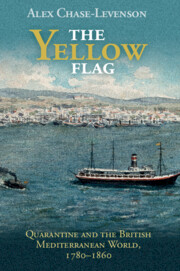Book contents
- The Yellow Flag
- Global Health Histories
- The Yellow Flag
- Copyright page
- Dedication
- Contents
- Figures
- Acknowledgments
- Note on the Text and Translations
- Introduction
- Part I Mediterranean Currents
- Part II Lazarettos, Health Boards, and the Building of a Biopolity
- Part III Imagining the Plague
- 6 Plague and “Civilization”
- 7 A Prescription for England’s Condition
- Part IV Old Patterns, New Cordons
- Bibliography
- Index
7 - A Prescription for England’s Condition
from Part III - Imagining the Plague
Published online by Cambridge University Press: 27 March 2020
- The Yellow Flag
- Global Health Histories
- The Yellow Flag
- Copyright page
- Dedication
- Contents
- Figures
- Acknowledgments
- Note on the Text and Translations
- Introduction
- Part I Mediterranean Currents
- Part II Lazarettos, Health Boards, and the Building of a Biopolity
- Part III Imagining the Plague
- 6 Plague and “Civilization”
- 7 A Prescription for England’s Condition
- Part IV Old Patterns, New Cordons
- Bibliography
- Index
Summary
Chapter 7 highlights the centrality of the history of Mediterranean plague and quarantine to the birth of the public health movement in Britain. Even though bubonic plague is often considered to be a premodern problem, its diffuse and dramatic reputation thoroughly shaped conceptions of other nineteenth-century killer epidemics –– cholera in particular. The chapter reconsiders the much-discussed “contagion debate” within this wider, transnational genealogy of public health. The fight between those who believed epidemic disease was communicated by contact and proximity (“contagionists”) and those who believed that epidemics spread because of atmospheric factors, such as temperature, winds, marsh exhalations, or other putrefying matter (“anticontagionists” or “miasmatists”) has achieved a tired reputation in recent historiography, which casts it as professional posturing in the midst of broad agreement. While this may be true when it comes to cholera, by focusing on quarantine and plague, the broader significance of these medical arguments is more readily apparent. In part thanks to quarantine, public health reformers tended to present problems in explicitly national terms or within dichotomies of national versus foreign. Because of the way they undergirded this national framing, plague and quarantine are an influential part of the genesis of what has been called the “Condition of England Question.”
Keywords
- Type
- Chapter
- Information
- The Yellow FlagQuarantine and the British Mediterranean World, 1780–1860, pp. 179 - 216Publisher: Cambridge University PressPrint publication year: 2020



